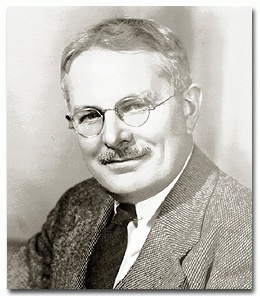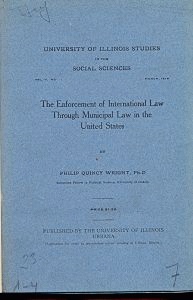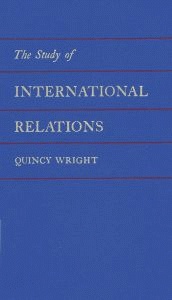Wright, Quincy
 Philip Quincy Wright
Philip Quincy Wright
Amerikanischer Politikwissenschaftler und Völkerrechtler, Begründer der quantitativen Kriegsursachenforschung, Mitbegründer der Disziplin Internationale Beziehungen und der Friedens- und Konfliktforschung, Berater der amerikanischen Delegation und des US-Chefanklägers Robert H. Jackson bei den Nürnberger Prozessen
* 28.12.1890 in Medford, Mass.
† 17.10.1970 in Charlotteville, Va.
Werdegang
1912 AB am Lombard College, Galesburg, Ill.
1913 AM an der University of Illinois
1915 PhD an der University of Illinois
1915-1916 Research Fellow an der University of Pennsylvania
1916-1919 Assistant und Instructor für Internationales Recht an der Harvard University
1919-1923 Professor für Politikwissenschaft an der University of Minnesota
1923-1931 Professor für Politikwissenschaft an der University of Chicago
1931-1956 Professor für Internationales Recht an der University of Chicago
1956-1957 Visiting Research Scholar bei der Carnegie Endowment for International Peace
1958-1961 Professor für Außenpolitik an der University of Virginia
Gastprofessuren
1929 Brookings Institution, Washington D.C.
1931 Seminar on Latin American Affairs, Mexico City
1934/1938 Graduate Institute on International Studies, Genf
1949 Turkish Institute on International Law
1959 Academy of International Law, Den Haag
1961 University of Manchester
1962-1963 Columbia University, New York
1964 American University, Kairo
1965 Cornell University, Ithaca
1966 Rice University
1968 University of Michigan
Außerakademische Tätigkeiten
1918/1921 Berater des US Navy Departments
1943-1944 Berater des Department of State
1945 Berater der amerikanischen Delegation beim Internationalen Militär Tribunal in Nürnberg
1949 Berater der UNESCO
1949-1950 Berater des amerikanischen Hohen Kommissars in Deutschland
Mitgliedschaften
American Academy of Arts and Sciences
American Association of University Professors (1944-1946 Präsident)
American Philosophical Society
American Political Science Association (1949 Präsident)
American Society of International Law (1956 Präsident)
Commission to Study the Organization of Peace (1953-1959 Chairman des Drafting Committee)
Council for the Study of Mankind (1958-1965 Chairman des Executive Committee)
International Law Association
International Political Science Association (1950 Präsident)
US United Nations Association
Publikationen
Bücher
 The Enforcement of International Law through Municipal Law in the United States. UrbanaUniversity of Illinois 1916.
The Enforcement of International Law through Municipal Law in the United States. UrbanaUniversity of Illinois 1916.
(Nachdr. New York: Johnson 1967) (= Diss.)
Limitation of Armament. New York: Institute of International Education 1921.
The Control of American Foreign Relations. New York: Macmillan 1922.
The Future of Neutrality. New York: Carnegie Endowment for International Peace 1928.
The Permanent Court of International Justice. New York: Carnegie Endowment for International Peace 1927.
Interpretation of American Foreign Policy. Chicago: University of Chicago Press 1930.
Research in International Law since the War: A Report to the International Relations Committee of the Social Research Council. Washington 1930.
Mandates under the League of Nations. Chicago: University of Chicago Press 1930.

The Causes of War and the Conditions of Peace. London: Longmans 1935.
mit Hersh Lauterpacht, Edwin Montefiore Borchard, Phoebe Morrison
Legal Problems in the Far Eastern Conflict. New York: International Secretariat, Institute of Pacific Relations 1941.
A Study of War. Chicago: University of Chicago Press 1942. (2 Bde.)
(2. erweit. Aufl. 2 Bde. Chicago: University of Chicago Press 1967)
(Abridged edition by Louise Leonard Wright. Chicago: University of Chicago Press 1964. midway Reprint 1983.)
Problems of Stability and Progress in International Relations. Berkeley: University of California Press 1954.
 The Study of International Relations. New York: Appleton-Century-Crofts 1955.
The Study of International Relations. New York: Appleton-Century-Crofts 1955.
Contemporary International Law: A Balance Sheet. Garden City: Doubleday 1955.
International Law and the United Nations. Under the Auspices of the Indian School of International Studies. Bombay: Asia Publications House 1960.
The Role of International Law in the Elimination of War. Manchester: Manchester University Press 1961.
Essays on Espionage and International Law. Columbus: Ohio State University Press 1962.
On Predicting International Relations. Denver: University of Denver 1969.
Herausgeberschaften
A Foreign Policy for the United States. Chicago: University of Chicago Press 1947.
The World Community. Chicago: University of Chicago Press 1948.
mit William M. Evan und Morton Deutsch
Preventing World War III: Some Proposals. New York: Simon and Schuster 1962.
Aufsätze
The Legal Nature of Treaties. In: American Journal of International Law 10.1916, 4. S. 706-736.
Conflicts of International Law with National Laws and Ordinances. In: American Journal of International Law 11.1917, 1. S. 1-21.
The Destruction of Neutral Property on Enemy Vessels. In: American Journal of International Law 11.1917, 2. S. 358-379.
Conflicts Between International Law and Treaties. In: American Journal of International Law 11.1917, 3. S. 566-579.
Treaties and the Constitutional Separation of Powers in the United States. In: American Journal of International Law 12.1918, 1. S. 64-95.
Territorial Propinquity. In: American Journal of International Law 12.1918, 3. S. 519-561.
The Legal Liability of the Kaiser. In: American Political Science Review 13.1919, 1. S. 120-128.
The Constitutionality of Treaties. In: American Journal of International Law 13.1919, 2. S. 242-266.
Effects of the League of Nations Covenant. In: American Political Science Review 13.1919, 4. S. 556-576.
Validity of the Proposed Reservations to the Peace Treaty. In: Columbia Law Review 20.1920, 2. S. 121-152.
The Understanding of International Law. In: American Journal of International Law 14.1920, 4. S. 565-580.
The Control of Foreign Relations. In: American Political Science Review 15.1921, 1. S. 1-26.
The Washington Conference. In: American Political Science Review 16.1922, 2. S. 285-297.
International Law in its Relation to Constitutional Law. In: American Journal of International Law 17.1923, 2. S. 234-244.
Sovereignty of the Mandates. In: American Journal of International Law 17.1923, 4. S. 691-703.
Suits Brought by Foreign States with Unrecognized Governments. In: American Journal of International Law 17.1923, 4. S. 742-746.
The Opium Question. In: American Journal of International Law 18.1924, 2. S. 281-295.
Status of the Inhabitants of Mandated Territory. In: American Journal of International Law 18.1924, 2. S. 306-315.
Changes in the Conception of War. In: American Journal of International Law 18.1924, 4. S. 755-767.
Treaties Conferring Rights in Mandated Territories. In: American Journal of International Law 18.1924, 4. S. 786-787.
The Outlawry of War. In: American Journal of International Law 19.1925, 1. S. 76-103.
The Bombardment of Damascus. In: American Journal of International Law 20.1926, 2. S. 263-280.
The Palestine Problem. In: Political Science Quarterly 41.1926, 3. S. 384-412.
The Government of Iraq. In: American Political Science Review 20.1926, 4. S. 743-769.
The United States and the Permanent Court of International Justice. In: American Journal of International Law 21.1927, 1. S. 1-25.
An Analytical Approach to the Subject of World Politics in Teaching and Research. In: American Political Science Review 21.1927, 2. S. 396-399.
American Foreign Policy, Domestic Control. In: Howland, Charles (Hrsg.): Survey of American Foreign Relations. New Haven: Council on Foreign Relations 1928. S. 83-148.
The Interpretation of Multilateral Treaties. In: American Journal of International Law 23.1929, 1. S. 94-107.
Some Legal Consequences if Extraterritoriality is Abolished in China. In: American Journal of International Law 24.1930, 2. S. 217-227.
The General Act for the Pacific Settlement of International Disputes. In: American Journal of International Law 24.1930, 3. S. 582-587.
The Proposed Termination of the Iraq Mandate. In: American Journal of International Law 25.1931, 3. S. 436-446.
The Manchurian Crisis. In: American Political Science Review 26.1932, 1. S. 45-76.
When does War Exist? In: American Journal of International Law 26.1932, 2. S. 362-368.
The Meaning of the Pact of Paris. In: American Journal of International Law 27.1933, 1. S. 39-61.
mit James T. Russell
National Attitudes on the Far Eastern Controversy. In: American Political Science Review 27.1933, 4. S. 555-576.
The Narcotics Convention of 1931. In: American Journal of International Law 28.1934, 3. S. 475-486.
An American View of Far Eastern Problems. In: International Affairs 14.1935, 1. S. 69-88.
The Concept of Aggression in International Law. In: American Journal of International Law 29.1935, 3. S. 373-395.
The Rhineland Occupation and the Enforcement of Treaties. In: American Journal of International Law 30.1936, 3. S. 486-494.
National Sovereignty and Collective Security. In: Annals of the American Academy of Political and Social Science Vol. 186, 1936. S. 94-104.
Population and International Relations. In: Annals of the American Academy of Political and Social Science Vol. 188, 1936. S. 318-328.
The Denunciation of Treaty Violators. In: American Journal of International Law 32.1938, 3. S. 526-535.
The Causation and Control of War. In: American Sociological Review 3.1938, 4. S. 461-474.
The Munich Settlement and International Law. In: American Journal of International Law 33.1939, 1. S. 12-32.
mit Carl J. Nelson
American Attitudes Toward Japan and China, 1937-38. In: Public Opinion Quarterly 3.1939, 1. S. 46-62.
Rights and Duties Under International Law: As Affected by the United States Neutrality Act and the Resolutions of Panama. In: American Journal of International Law 34.1940, 2. S. 238-248.
International Affairs: International Law and the Totalitarian States. In: American Political Science Review 35.1941, 4. S. 738-743.
Inventions and War. In: The Scientific Monthly 53.1941, 6. S. 526-541.
Repeal of the Neutrality Act. In: American Journal of International Law 36.1942, 1. S. 8-23.
International Law and the Balance of Power. In: American Journal of International Law 37.1943, 1. S. 97-103.
National Security and International Police. In: American Journal of International Law 37.1943, 3. S. 499-505.
United Nations-Phrase or Reality? In: Annals of the American Academy of Political and Social Science Vol. 228, 1943. S. 1-10.
Peace Problems of Today and Yesterday. In: American Political Science Review 38.1944, 3. S. 512-521.
The Legal Problem. DeHuszar, George (Hrsg.): New Perspectives on Peace. Chicago: University of Chicago Press 1944. S. 143-161.
The United States and International Agreements. In: American Journal of International Law 38.1944, 3. S. 341-355.
War Criminals. In: American Journal of International Law 39.1945, 2. S. 257-285.
The Value of International Law in Occupied Territory. In: American Journal of International Law 39.1945, 4. S. 775-783.
Accomplishments and Expectations of World Organization. In: Yale Law Journal 55.1946, 5. S. 870-888.
Making the United Nations Work. In: Review of Politics 8.1946, 4. S. 528-532.
The Law of the Nuremberg Trial. In: American Journal of International Law 41.1947, 1. S. 38-72.
The International Court of Justice and the Interpretation of Multilateral Treaties. In: American Journal of International Law 41.1947, 2. S. 445-452.
Legal Positivism and the Nuremberg Judgment. In: American Journal of International Law 42.1948, 2. S. 405-414.
Recent Trends in the Evolution of the United Nations. In: International Organization 2.1948, 4. S. 617-631.
Responsibility for Injuries to United Nations Officials. In: American Journal of International Law 43.1949, 1. S. 95-104.
The Jural Personality of the United Nations. In: American Journal of International Law 43.1949, 3. S. 509-516.
Political Science and World Stabilization. In: American Political Science Review 44.1950, 1. S. 1-13.
American Policy Toward Russia. In: World Politics 2.1950, 4. S. 463-481.
National Courts and Human Rights-The Fujii Case. In: American Journal of International Law 45.1951, 1. S. 62-82.
Realism and Idealism in International Politics. In: World Politics 5.1952, 1. S. 116-128.
Proposal for an International Criminal Court. In: American Journal of International Law 46.1952, 1. S. 60-72.
The Outlawry of War and the Law of War. In: American Journal of International Law 47.1953, 3. S. 365-376.
Economic and Political Conditions of World Stability. In: Journal of Economic History 13.1953, 4. S. 363-377.
Moral Standards in Government and Politics. In: Ethics 64.1954, 3. S. 157-168.
Human Rights and Charter Revision. In: Annals of the American Academy of Political and Social Science Vol. 296, 1954. S. 46-55.
International Organization and Peace. In: Western Political Quarterly 8.1955, 2. S. 149-165.
Is Discussion Intervention? In: American Journal of International Law 50.1956, 1. S. 102-110.
The Prevention of Aggression. In: American Journal of International Law 50.1956, 3. S. 514-532.
The Mode of Financing Unions of States as a Measure of their Degree of Integration. In: International Organization 11.1957, 1. S. 30-40.
The Value for Conflict Resolution of a General Discipline of International Relations. In: Conflict Resolution 1.1957, 1. S. 3-8.
Intervention, 1956. In: American Journal of International Law 51.1957, 2. S. 257-276.
Design for a Research Project on International Conflicts and the Factors Causing Their Aggravation or Amelioration. In: Western Political Quarterly 10.1957, 2. S. 263-275.
International Conflict and the United Nations. In: World Politics 10.1957, 1. S. 24-48.
United States Intervention in the Lebanon. In: American Journal of International Law 53.1959, 1. S. 112-125.
Subversive Intervention. In: American Journal of International Law 54.1960, 3. S. 521-535.
Western Diplomacy Since 1945. In: Annals of the American Academy of Political and Social Science 336.1961. S. 144-153.
Toward a Universal Law for Mankind. In: Columbia Law Review 63.1963, 3. S. 435-458.
The Cuban Quarantine. In: American Journal of International Law 57.1963, 3. S.
546-565.
The Projected European Union and American International Prestige. In: Annals of the American Academy of Political and Social Science 348.1963. S. 132-140.
The Escalation of International Conflicts. In: Journal of Conflict Resolution 9.1965, 4. S. 434-449.
Legal Aspects of the Viet-Nam Situation. In: American Journal of International Law 60.1966, 4. S. 750-769.
The Termination and Suspension of Treaties. In: American Journal of International Law 61.1967, 4. S. 1000-1005.
The Middle East Problem. In: American Journal of International Law 64.1970, 2. S. 270-281.
How Hostilities Have Ended: Peace Treaties and Alternatives. In: Annals of the American Academy of Political and Social Science 392.1970. S. 51-61.
Festschrift
Whiting, Allen S.: In Memoriam: Quincy Wright, 1890-1970 – A
Symposium. In: Journal of Conflict Resolution 14.1970, 4. S. 443-448.
Sekundärliteratur
Angell, Robert: Quincy Wright: A Personal Memoir. In: Journal of Conflict Resolution 14.1970, 4. S. 457-459.
Ballis, William: Quincy Wright: An Appreciation. In: Journal of Conflict Resolution 14.1970, 4. S. 453-455.
Beck, Robert: A Study of War and An Agenda for Peace: Reflections on the Contemporary Relevance of Quincy Wright's Plan for a 'New International Order'. In: Review of International Studies 22.1996, 2. S.119-148.
Broch, Tom/ Galtung, Johan: Belligerence among the Primitives: A Re-analysis of Quincy Wright's Data. In: Journal of Peace Research 3.1966, 1. S. 33-45.
Bucklin, Stephen: Quincy Wright's Blueprint for A Durable Peace. In: Mid-America 76.1994, 3. S.227-240.
Claude, Inis Jr.: The Heritage of Quincy Wright. In: Journal of Conflict Resolution 14.1970, 4. S. 461-464.
Corbett, Percy: Quincy Wright's Contribution to International Law. In: Journal of Conflict Resolution 14.1970, 4. S. 465-466.
Davis, Christopher Mark: War and Peace in a Multipolar World: A critique of Quincy Wright's Institutionalist Analysis of the Interwar International System. In: Journal of Strategic Studies 19.1996, 1. S.31-73.
Deutsch, Karl W.: Quincy Wright's Contribution to the Study of War: A Preface to the Second Edition. In: Journal of Conflict Resolution 14.1970, 4. S. 473-478.
Falk, Richard: Quincy Wright: On Legal Tests of Aggressive War. In: American Journal of International Law 66.1972, 3. S. 560-571.
Finch, Eleanor: Quincy Wright, 1890-1970. In: American Journal of International Law 65.1971, 1. S. 130-131.
Fink, Clinton/Wright, Christopher: Quincy Wright on War and Peace: A Statistical Overview and Selected Bibliography. In: Journal of Conflict Resolution 14.1970, 4. S. 543-554.
Fox, William T. R.: "The Truth Shall Make You Free": One Student's Appreciation of Quincy Wright. In: Journal of Conflict Resolution 14.1970, 4. S. 449-452.
Gray, Robert C.: Landmarks in Defense Literature - A Study of War. In: Defense Analysis 14.1998, 2. S.199-204.
Griggs, Emily Hill: A Result before 'Realism': Quincy Wright and the Study of International Politics between two World Wars. In: Journal of Strategic Studies 24.2001, 1. S.71-103.
Hillmann, Robert: Quincy Wright and the Commission to Study the Organization of Peace. In: Global Governance 4.1998, 4. S.485-500.
Jacobson, Harold: Quincy Wright's Study of the Mandates System. In: Journal of Conflict Resolution 14.1970, 4. S. 499-503.
Kaplan, Morton A.: Toward a Theory of International Politics: Quincy Wright's Study of International Relations and Some Recent Developments (Buchbesprechung von Study of International Relations). In: Journal of Conflict Resolution 2.1958, 4. S. 335-347.
Kelsen, Hans: Quincy Wright's A Study of War and the Bellum Justum Theory. In: Ethics 53.1943, 3. S. 208-211.
Scheips, Paul: In Memoriam: Quincy Wright, 1890-1970. In: Military Affairs 35.1971, 2. S. 49.
Thompson, Kenneth: Policy and Theory in Quincy Wright's International Relations. In: Journal of Conflict Resolution 14.1970, 4. S. 479-485.
Thompson, Kenneth: Quincy Wright. In: Utter, Glenn/Lockhart, Charles (Hrsg.): American Political Scientist: A Dictionary. Westport: Greenwood Press 1993.
HN
 Philip Quincy Wright
Philip Quincy Wright The Enforcement of International Law through Municipal Law in the United States. UrbanaUniversity of Illinois 1916.
The Enforcement of International Law through Municipal Law in the United States. UrbanaUniversity of Illinois 1916.
 The Study of International Relations. New York: Appleton-Century-Crofts 1955.
The Study of International Relations. New York: Appleton-Century-Crofts 1955.